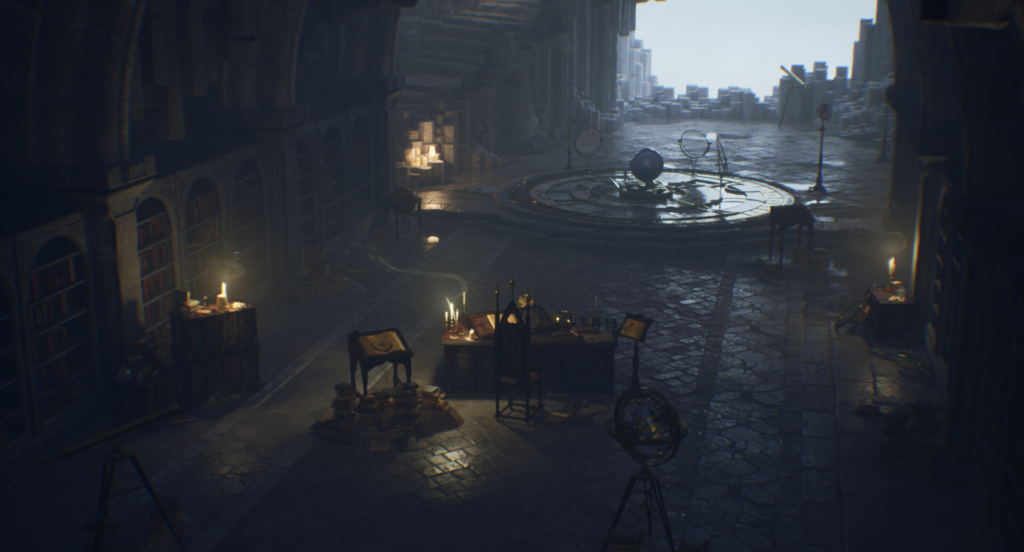Wushu Roundtable with 3D Generalist Andrew Weir
Greetings all!
We’re continuing with our Wushu Roundtable series and this time we had the chance to chat with 3D Generalist and Environment Artist Andrew Weir. 3D art can be a difficult but highly rewarding trade. Andrew was happy to share his history in the craft with us including his time in university, creative inspiration, and more.
We hope you enjoy!
Thanks for sitting and chatting with us Andrew!
Thank you, it’s a pleasure!
Did you always know you wanted to forge a career in game development?
It sounds very silly to say but growing up, nobody talked about it as a career. So it never crossed my mind as something to study or try naturally. However, I did play a lot of LittleBigPlanet 1 and 2. I would create circuits and AI and try do crazy things with the character. Mostly things related to The Last Airbender like Air Scooters and Fire Bending. Then, in an optional school module, we had the opportunity to use Game Maker Studio and Scratch. I was very excited to learn I’d been doing the exact same work, but for fun on LittleBigPlanet 2. This sparked an interest in art in college – where I tested working with stop motion animation and Adobe After Effects. Eventually I found Blender 3D which led me to games!
How was majoring in games design in university for you? You’d worked on a major design project towards the end right?
It was a fantastic course to choose! I met a lot of great people and it allowed me to fully explore the full games art cycle with industry standard software. They would usually run several big tasks at once. For example at one point I was making a character and two environments with another written module on the side. All of them included their own writing here and there. But that is a lot to work with and learn for the first time, while also having 30 hours of bar work to cram into my weekends. The bar and uni work somehow turned into being a rest from each other.I left my bar job half way through my final year to fully focus down on the final projects. I created a project inspired by the work of FeiGiap and
How has working with a team in a professional setting been compared to something more academic like uni?
University is very much a solo venture surrounded by other people doing similar things. A lot of people were comfortable sharing what they learn and helping when asked. But it’s understandable with everyone eventually wanting the same jobs that some exclusivity behind what people were working on would appear. I wasn’t a big fan of this in my time at uni, and my work was always an open book to those that followed it. I still keep this up with personal work.
Working in the games industry is very different however, especially here at Wushu. It’s very easy to walk around and quiz people about something I think is cool on the other side of the room. You get to see everyone work and I like to see things develop as they are made rather than suddenly having an amazing result. It’s great having other artists around to fill me in rather than going on a 3 hour Google trip to find out things could have been done easier!
The term “3D Generalist” can mean a lot of things to anyone outside of the field. How would you best describe it?
Artwork in large companies can be divided down to the smallest of tasks for a title. In a smaller company like Wushu, it would be impractical for me to just be a pure Environment Artist. Although that does cover the majority of my tasks. Depending on what day you ask me, I could be doing props, textures, shader work, minor blueprinting, lighting and so on! So rather than have a title per field, I class as a Generalist. I have specialized in some areas of development, but if something needs to be done I’ll happily jump in and explore that task to the best of my knowledge. I can always fall back on other artists when it is too far outside of my comfort zone. Overall 3D Generalist, to me, just means I love working on whatever is thrown my way, and I learn fast!
Is there a particular specialty that you enjoy more than others?
When I first started making 3D artwork, I’d spend a lot of time on character art. Sculpting in Blender 2.6 wasn’t the best experience for someone who didn’t understand that poly counts are important. I eventually made my first environment instead around May 2013, and I found it a little easier. I am always happy to look at early work, so bringing this back up is quite funny! Real-time rendering wasn’t something I was familiar with at this point.

And in my personal time I continue to work on my real-time environments and materials. My latest work was made for the ArtStation Community Challenge, which was covered in the latest Wushu Weekly post!

What advice would you give students interesting in pursuing a career in art in games? 3D art especially.
How do you go about getting inspiration or reference points for the art you produce? Is there a process for you?
The initial spark will usually come from a game, movie or concept I stumble across. Things that inspire me. I surround myself with artwork and it’s practically all I see on any of the social media platforms I use. The ArtStation add-on for internet browsers, such as Chrome, is great too. I’m presented with some random artwork with every new tab I open. It’s passively throwing interesting content at me! But following the groups and discord servers where people post work-in-progress is also great.
Once all of that stuff inspires me, I’ll generally use Pinterest and G oogle images to find image references. I find Pinterest to be a great way to go down a rabbit hole of content I wouldn’t normally see. For example, while searching for machinery to make, I randomly stumbled across aircraft pushback tractors. That was an interesting vehicle I decided to model.
There’s one final, absolutely incredible inquiry to end with: Your top 3 games in the last decade. Go!
Of the last decade?! Ahhh! Uhh…that’s a lot of great content to choose from! I’m usually a fan of shorter narrative based experiences. I’ll pick up games like RiME, Edith Finch, Firewatch and Journey. But I’ll keep them as honourable mentions!
When it comes to games I’ve played the most in the last decade, I need to put The Last Of Us up there as a fantastic narrative driven game, and it’s a lot of people’s top pick for plenty of reasons. The music, story, atmosphere and gameplay was great! I put it up there because I also played the multiplayer to death alongside friends! It had solid gameplay and interesting mechanics. Can’t wait to see what they do with the next one.
Second for me is The Witness. Not exactly the most riveting gameplay wise and I played it very slowly over a year. But the artwork is fantastic and once you start unlocking the world and finding out the solutions to mechanics, it sends your mind all over the place. It’s great to feel like you are making clever discoveries every time you open the game. I get similar feelings of discovery from playing Outer Wilds too.
Thirdly, I want to say Portal 2. This ties together all of the above. With a great narrative, puzzles and multiplayer. It would be very easy to forget how good this game was with so many great games in 2011 and more recently. But it will always come back up to the top when I think about how great the ending was. That was a very tough question! I could drop more names, such as Zelda, but I’ll stick with those games as some of the finest work in the last decade.
Appreciate the time Andrew!
That was fun, thank you!
Thanks for checking out this segment of Wushu Roundtable everyone. Be sure to keep an eye on our social channels on Twitter, Instagram and Facebook for more upcoming fun initiatives from us. Until next time!
___________________________________________________________________________________________________________________________________________
Nate Najda
Communications Manager

